
The Fertile Crescent is a crescent-shaped region in the Middle East, spanning modern-day Iraq, Syria, Lebanon, Israel, Palestine and Jordan, together with the northern region of Kuwait, southeastern region of Turkey and the western portion of Iran. Some authors also include Cyprus and Northern Egypt.

Bath is a city in the Bath and North East Somerset unitary area in the county of Somerset, England, known for and named after its Roman-built baths. At the 2021 Census, the population was 101,557. Bath is in the valley of the River Avon, 97 miles (156 km) west of London and 11 miles (18 km) southeast of Bristol. The city became a World Heritage Site in 1987, and was later added to the transnational World Heritage Site known as the "Great Spa Towns of Europe" in 2021. Bath is also the largest city and settlement in Somerset.

An adjustable spanner or adjustable wrench is any of various styles of spanner (wrench) with a movable jaw, allowing it to be used with different sizes of fastener head rather than just one fastener size, as with a conventional fixed spanner.

A factory, manufacturing plant or a production plant is an industrial facility, often a complex consisting of several buildings filled with machinery, where workers manufacture items or operate machines which process each item into another. They are a critical part of modern economic production, with the majority of the world's goods being created or processed within factories.
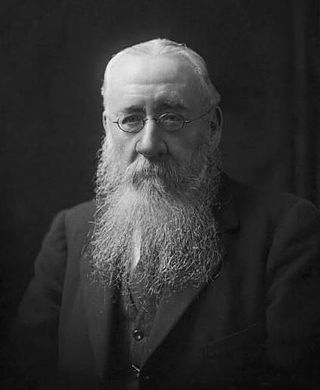
George Edward Bateman Saintsbury, FBA, was an English critic, literary historian, editor, teacher, and wine connoisseur. He is regarded as a highly influential critic of the late 19th and early 20th century.

Sud Aviation was a French state-owned aircraft manufacturer, originating from the merger of Sud-Est and Sud-Ouest on 1 March 1957. Both companies had been formed from smaller privately owned corporations that had been nationalized into six regional design and manufacturing pools just prior to the Second World War.

A paper mill is a factory devoted to making paper from vegetable fibres such as wood pulp, old rags, and other ingredients. Prior to the invention and adoption of the Fourdrinier machine and other types of paper machine that use an endless belt, all paper in a paper mill was made by hand, one sheet at a time, by specialized laborers.

Allgemeine Elektricitäts-Gesellschaft AG was a German producer of electrical equipment founded in Berlin as the Deutsche Edison-Gesellschaft für angewandte Elektricität in 1883 by Emil Rathenau. During the Second World War, AEG worked with the Nazi Party and benefited from forced labour from concentration camps. After World War II, its headquarters moved to Frankfurt am Main.

Crescent Foods, Inc., was a Seattle, Washington, spice and flavorings company founded in 1883 that was bought by McCormick & Company in 1989.
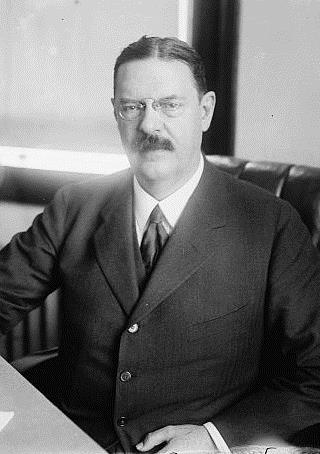
Lewis Nixon was a naval architect, shipbuilding executive, public servant, and political activist. He designed the United States' first modern battleships, and supervised the construction of its first modern submarines, all before his 40th birthday. He was briefly the leader of Tammany Hall. He started an ill-fated effort to run seven major American shipyards under common ownership as the United States Shipbuilding Company, and he was the chair of the New York City commission building the Williamsburg Bridge.
Pope Manufacturing Company was founded by Albert Augustus Pope around 1876 in Boston, Massachusetts, US and incorporated in Hartford, Connecticut in 1877. Manufacturing of bicycles began in 1878 in Hartford at the Weed Sewing Machine Company factory. Pope manufactured bicycles, motorcycles, and automobiles. From 1905 to 1913, Pope gradually consolidated manufacturing to the Westfield Mass plant. The main offices remained in Hartford. It ceased automobile production in 1915 and ceased motorcycle production in 1918. The company subsequently underwent a variety of changes in form, name and product lines through the intervening years. To this day, bicycles continue to be sold under the Columbia brand.

This is a bibliography of major works on the History of Canada.
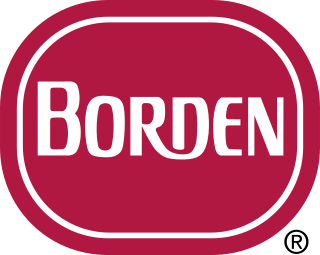
Borden, Inc., was an American producer of food and beverage products, consumer products, and industrial products. At one time, the company was the largest U.S. producer of dairy and pasta products. Its food division, Borden Foods, was based in Columbus, Ohio, and focused primarily on pasta and pasta sauces, bakery products, snacks, processed cheese, jams and jellies, and ice cream. It was best known for its Borden Ice Cream, Meadow Gold milk, Creamette pasta, and Borden Condensed Milk brands. Its consumer products and industrial segment marketed wallpaper, adhesives, plastics and resins. By 1993, sales of food products accounted for 67 percent of its revenue. It was also known for its Elmer's and Krazy Glue brands.
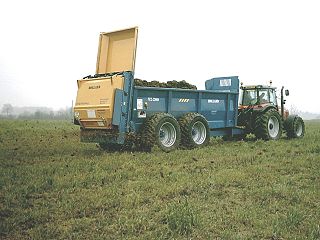
A manure spreader or muck spreader or honey wagon is an agricultural machine used to distribute manure over a field as a fertilizer. A typical (modern) manure spreader consists of a trailer towed behind a tractor with a rotating mechanism driven by the tractor's power take off (PTO). Truck mounted manure spreaders are also common in North America.

Brush Electrical Machines is a manufacturer of electrical generators typically for gas turbine and steam turbine driven applications. The main office is based at Loughborough in Leicestershire, UK.

The Crescent Brass and Pin Company Building is located at 5766 Trumbull Street in Detroit, Michigan. It was listed on the National Register of Historic Places in 2003. It is currently known as the Research Lofts on Trumbull.
Crescent is a brand of hand tools. It originated with the Crescent Tool Company, founded in 1907. The Crescent brand has changed ownership multiple times. It is currently owned by Apex Tool Group, LLC of Sparks, Maryland as part of its Hand Tools division. It is best known for its style of adjustable wrench.
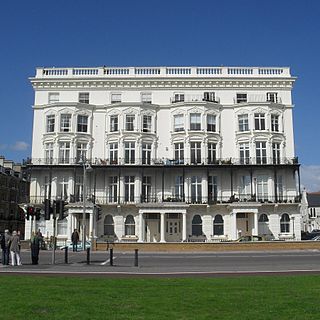
Adelaide Mansions is a residential building on the seafront in Hove, part of the city of Brighton and Hove in East Sussex, England. The "handsome block", decorated with ornate details, was erected in 1873 to the design of local architect Thomas Lainson. English Heritage has listed the building at Grade II for its architectural and historical importance.
Indiana Glass Company was an American company that manufactured pressed, blown and hand-molded glassware and tableware for almost 100 years. Predecessors to the company began operations in Dunkirk, Indiana, in 1896 and 1904, when East Central Indiana experienced the Indiana gas boom. The company started in 1907, when a group of investors led by Frank W. Merry formed a company to buy the Dunkirk glass plant that belonged to the bankrupt National Glass Company. National Glass was a trust for glass tableware that originally owned 19 glass factories including the plant in Dunkirk. National Glass went bankrupt in 1907, and its assets were sold in late 1908.

Western Wheel Works was a Chicago bicycle company started by Adolph Schoeninger in 1866. It was one of the largest bicycle makers in the world. In 1899 it joined a trust which controlled 95 percent of the bicycle manufacturing market.
















